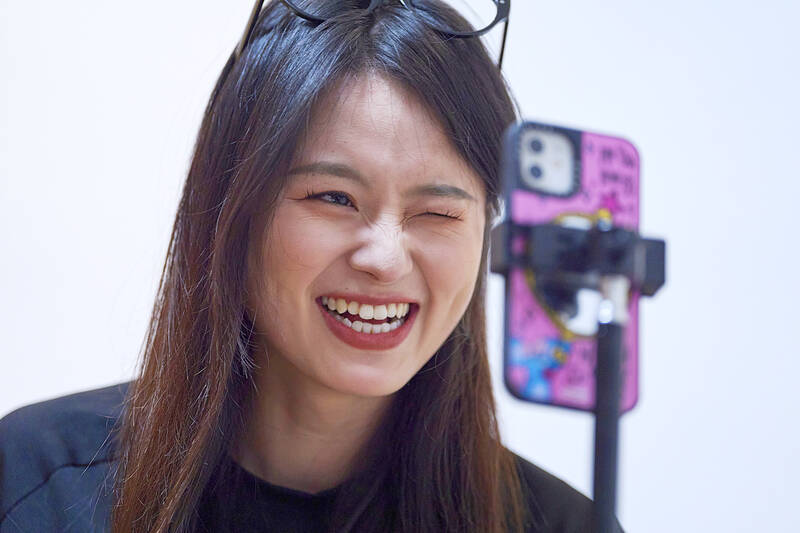Steve Chen had never been in love. Last spring though, it happened. The 25-year-old met his first girlfriend in a way he couldn’t have imagined before: a livestreamed video chat.
Frustrated with traditional dating and using the apps, Chen jumped on a new trend among young, single people in China. Those looking for love go into video chatrooms hosted by what’s called a “cyber matchmaker,” all while thousands of viewers watch and comment in real time.
The number of single people in China over 15 reached a record-high of 240 million in 2023, according to government data. Facing a plummeting birth rate and an aging population, the government encouraged single people to marry and have multiple children. Last year, the State Council, China’s cabinet, mandated that local governments build various platforms for youth to have more opportunities to date.

Photo: AP
“We should actively foster a new type of marriage and childbearing culture,” Chinese President Xi Jinping () said in a speech in 2023, encouraging people to start families.
Shy and introverted, Chen found dating very hard. He used to describe himself as “mutai solo,” Chinese slang for single since in the mother’s womb.
But those days are over.

Photo: Reuters
In a livestreamed video chatroom, Chen fell in love.
It was hosted by Tian Xin, a cyber matchmaker who has livestreamed virtual group dates on Xiaohongshu — or RedNote, a Chinese social media app — for over a year.
By day, Tian works at a tech firm. At night, she transforms into a matchmaker who breaks the ice, cracks jokes, moderates conversations and sometimes offers relationship advice. Her account has over 130,000 followers.
“Empathy is the most important thing. You need to be empathetic to what people say,” Tian said.
At 11pm on a weeknight, over 800 viewers watched Tian’s video chatroom with background music of love-themed Chinese pop songs. Eight people were on camera, their faces arranged in a grid on the screen. Another dozen waited in a digital queue.
Tian started by asking each participant a similar set of questions: Age, weight, height, job, income, location, zodiac sign, hobbies and requirements for partners.
“Do you have a talent or skills to show us?” Tian asked one contestant, a PE teacher.
The man took off his shirt and flexed his biceps and six-pack abs. Mouths dropped open. Some clapped.
A new comment popped up in the chat with a series of laughing emojis: “Lol. Is dating so competitive these days?”
After the initial set of questions, participants chatted about their day-to-day lives and work as they went about their nightly routines — all on camera. One person washed off her makeup while another ate a late-night dinner of fried chicken.
As a medical student doing his residency, Chen said he had little free time to date.
“The pressure of study and work is very strong,” he said. “I don’t have time to socialize with people and make friends.”
Chen is not alone in feeling this way. Over 30 percent of young people who are single said it’s because of their busy work schedules, according to a report this year from iiMedia Research, a Chinese data analysis agency. Many companies in China ask employees to work 12-hour days, six days a week. In response, there’s a growing trend of “ lying flat,” or working as little as possible — and choosing to remain single — to resist societal pressures.
For those who want to get married though, the livestreamed videos are an appealing alternative to traditional matchmaking methods, like marriage markets — where families exchange resumes and arrange dates for their unmarried children.
They’re also another option for those tired of dating apps.
Christine Zhang said the livestreamed videos are more fun and interactive than the apps.
“You can see more than just photos on profiles in livestreams. You can see how one person speaks and acts,” Zhang said.
She started regularly tuning into Tian’s livestream, where Chen — also a regular — caught her eye. He sometimes danced and sang in front of the camera.
In front of hundreds of viewers on the livestream, Zhang shared that she had a crush on him. Other participants, along with an audience of hundreds of followers, were impressed by her courage. The matchmaker introduced them and encouraged them to talk one-on-one off the livestream. They texted and met up in person several months later.
Nearly a year later, the two are in a serious relationship.
They both said they feel lucky to have met.
“Finding love is hard. I had to muster the courage to share my feelings in front of the camera,” Zhang said. “I think only those who are brave find love.”

Dec. 8 to Dec. 14 Chang-Lee Te-ho (張李德和) had her father’s words etched into stone as her personal motto: “Even as a woman, you should master at least one art.” She went on to excel in seven — classical poetry, lyrical poetry, calligraphy, painting, music, chess and embroidery — and was also a respected educator, charity organizer and provincial assemblywoman. Among her many monikers was “Poetry Mother” (詩媽). While her father Lee Chao-yuan’s (李昭元) phrasing reflected the social norms of the 1890s, it was relatively progressive for the time. He personally taught Chang-Lee the Chinese classics until she entered public

Last week writer Wei Lingling (魏玲靈) unloaded a remarkably conventional pro-China column in the Wall Street Journal (“From Bush’s Rebuke to Trump’s Whisper: Navigating a Geopolitical Flashpoint,” Dec 2, 2025). Wei alleged that in a phone call, US President Donald Trump advised Japanese Prime Minister Sanae Takaichi not to provoke the People’s Republic of China (PRC) over Taiwan. Wei’s claim was categorically denied by Japanese government sources. Trump’s call to Takaichi, Wei said, was just like the moment in 2003 when former US president George Bush stood next to former Chinese premier Wen Jia-bao (溫家寶) and criticized former president Chen

Politics throughout most of the world are viewed through a left/right lens. People from outside Taiwan regularly try to understand politics here through that lens, especially those with strong personal identifications with the left or right in their home countries. It is not helpful. It both misleads and distracts. Taiwan’s politics needs to be understood on its own terms. RISE OF THE DEVELOPMENTAL STATE Arguably, both of the main parties originally leaned left-wing. The Chinese Nationalist Party (KMT) brought together radicals, dissidents and revolutionaries devoted to overthrowing their foreign Manchurian Qing overlords to establish a Chinese republic. Their leader, Sun Yat-sen

Late one night in April 2020, towards the start of the COVID lockdowns, Shanley Clemot McLaren was scrolling on her phone when she noticed a Snapchat post by her 16-year-old sister. “She’s basically filming herself from her bed, and she’s like: ‘Guys you shouldn’t be doing this. These fisha accounts are really not OK. Girls, please protect yourselves.’ And I’m like: ‘What is fisha?’ I was 21, but I felt old,” she says. She went into her sister’s bedroom, where her sibling showed her a Snapchat account named “fisha” plus the code of their Paris suburb. Fisha is French slang for